Key takeaways:
- Healthcare education emphasizes the integration of theory and practical experience, highlighting the importance of empathy in patient connections.
- Nurse educators play a crucial role in molding future professionals by fostering curiosity and bridging academic knowledge with practical application.
- Gaining clinical experience is transformative, teaching resilience and the value of trust in patient relationships.
- Transitioning to nurse education involves adapting communication styles, fostering a safe learning environment, and recognizing the mutual growth between educators and students.

Understanding Healthcare Education
Understanding healthcare education goes beyond just textbooks and lectures. It’s about shaping compassionate professionals who will enter a rapidly evolving field. I still remember my first day in nursing school, flooded with excitement and uncertainty, wondering how much impact my education would really have.
As I delved deeper into the curriculum, I realized that effective healthcare education integrates both theory and practical experiences. There was a moment during my clinical rotation when I connected with a patient on a personal level, and it dawned on me how crucial empathy is in our profession. How can we teach future nurses to connect with patients if we don’t model that ourselves in the educational setting?
Moreover, the landscape of healthcare is constantly shifting, calling for educational methods that adapt and innovate. Reflecting on my journey, I’ve seen how technology plays a vital role in our classrooms. Why should we stick to outdated techniques when interactive simulations can better prepare students for real-world challenges? It’s this blend of science, art, and emotional intelligence that truly defines healthcare education.
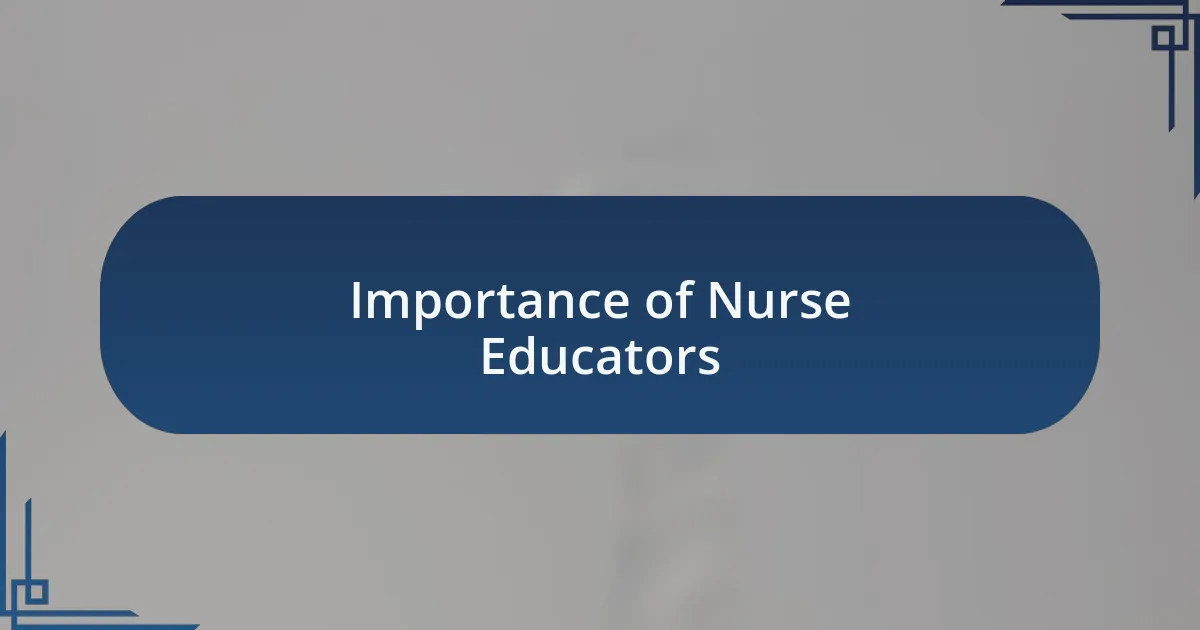
Importance of Nurse Educators
The role of nurse educators is pivotal in shaping the next generation of healthcare professionals. I’ve seen firsthand how empowered instructors can transform a classroom into a thriving environment where curiosity and commitment flourish. Imagine a classroom where students not only memorize facts but truly grasp the significance of compassionate care. This transformation is precisely what effective nurse educators cultivate.
Through my experiences, I’ve recognized that the relationship between educators and students can significantly impact clinical outcomes. When I was taught by someone who was genuinely passionate about nursing, it ignited a spark in me. Isn’t it inspiring when an educator sees potential in their students, encouraging them to dream bigger? This mentorship is invaluable, as it helps bridge the gap between academic knowledge and practical application.
Ultimately, nurse educators are the backbone of a resilient healthcare system. They don’t just impart knowledge; they instill values, ethics, and best practices in their students. In my early days of clinical practice, I frequently reflected on the lessons taught by my educators. Their influence resonated in my approach to patient care. How can we ensure excellence in the nursing profession without dedicated educators guiding the way?
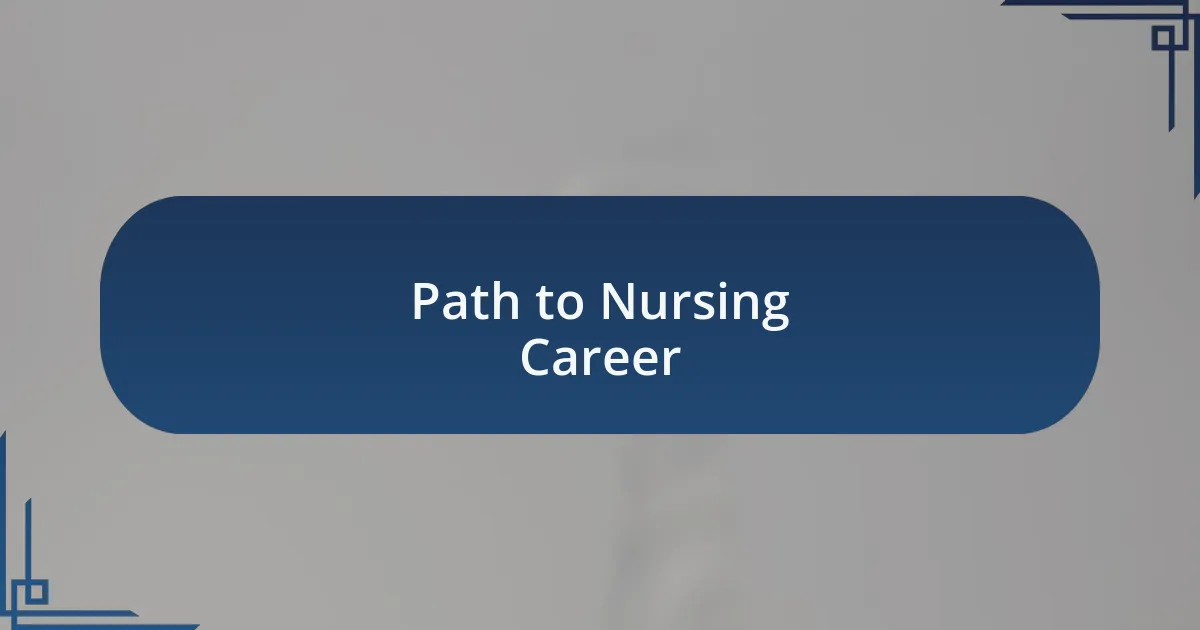
Path to Nursing Career
The journey to a nursing career often begins with a calling—a moment when you realize that caring for others isn’t just a job, but a passion. I still remember the day I volunteered at a local clinic; the empathy I felt for patients fueled my desire to dive deeper into the nursing world. Have you ever experienced a moment that made you reassess your path? That was my turning point, and it led me to enroll in nursing school.
As I immersed myself in my studies, I encountered the intensive coursework that defined the nursing landscape. The long nights blending textbook knowledge with hands-on skills were tough but exhilarating. I often found myself challenged, questioning if I could really commit to such a demanding field. Yet, each challenge felt like a step closer to the nurse I aspired to be, solidifying my resolve. How can we embrace the hard parts of our journey to find our true calling?
After earning my degree, the transition from student to registered nurse was a whirlwind of emotions. I vividly recall my first day on the floor, excitement tinged with nerves as I navigated patient care alongside seasoned nurses. It was in those moments of uncertainty that I learned the importance of collaborative teamwork and compassion. I reflect on those early days with gratitude; they shaped not only my nursing practice but also the educator I would later become. It’s fascinating to consider how each experience serves as a building block on our path to success, isn’t it?
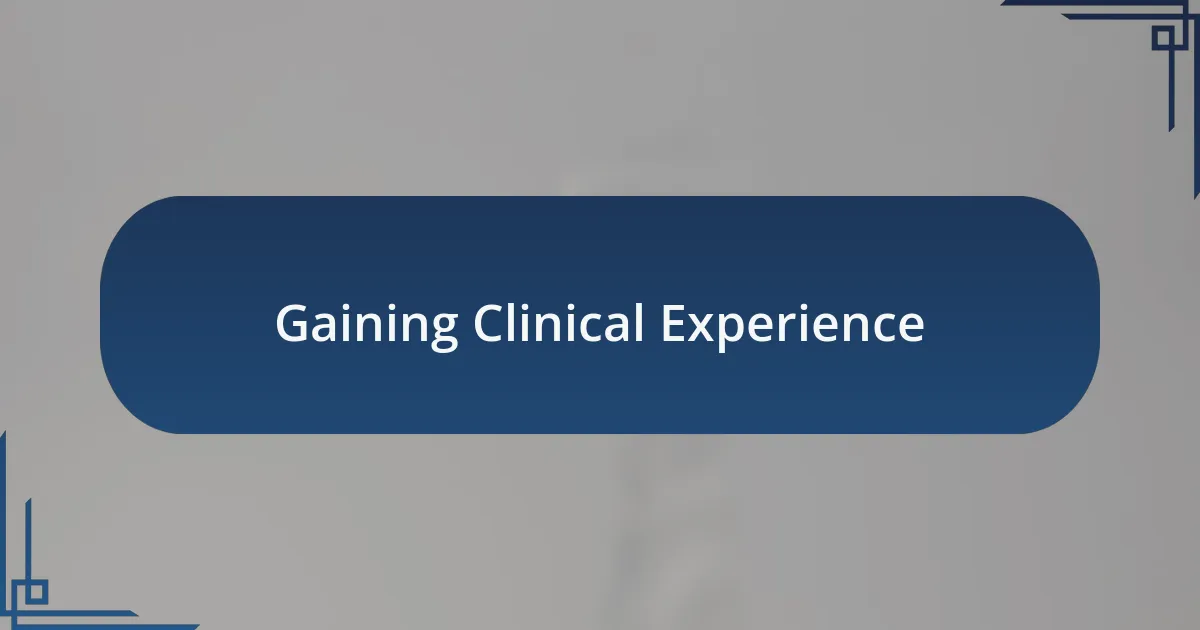
Gaining Clinical Experience
Gaining clinical experience was truly eye-opening for me. During my first rotation in a busy surgical unit, I witnessed the delicate balance of urgency and care. I vividly remember observing a surgeon in action, his calm demeanor amidst the chaos. It made me realize that nursing isn’t just about managing tasks; it’s about building relationships based on trust and reassurance. Have you ever felt that rush of inspiration when you see someone excel in their role?
As I continued my training, I rotated through various specialties, each providing unique challenges and rewards. I particularly enjoyed my time in pediatrics, where I learned to connect with young patients and their families. It was uplifting to bring a smile to a child’s face while explaining a procedure. Each encounter reinforced not only my clinical skills but also my approach to holistic care. Isn’t it incredible how even small interactions can leave a lasting impact?
One of the most profound lessons I learned came during a night shift in the emergency department. I was tasked with managing multiple patients with diverse needs, each presenting their own set of challenges. It was daunting but exhilarating, prompting me to think quickly and prioritize effectively. Looking back, that experience was instrumental in developing not just my nursing skills but also my resilience and adaptability. Have you found moments like these to be life-changing in your own journey? They undeniably shaped my perspective on what it means to be an educator in the nursing field.
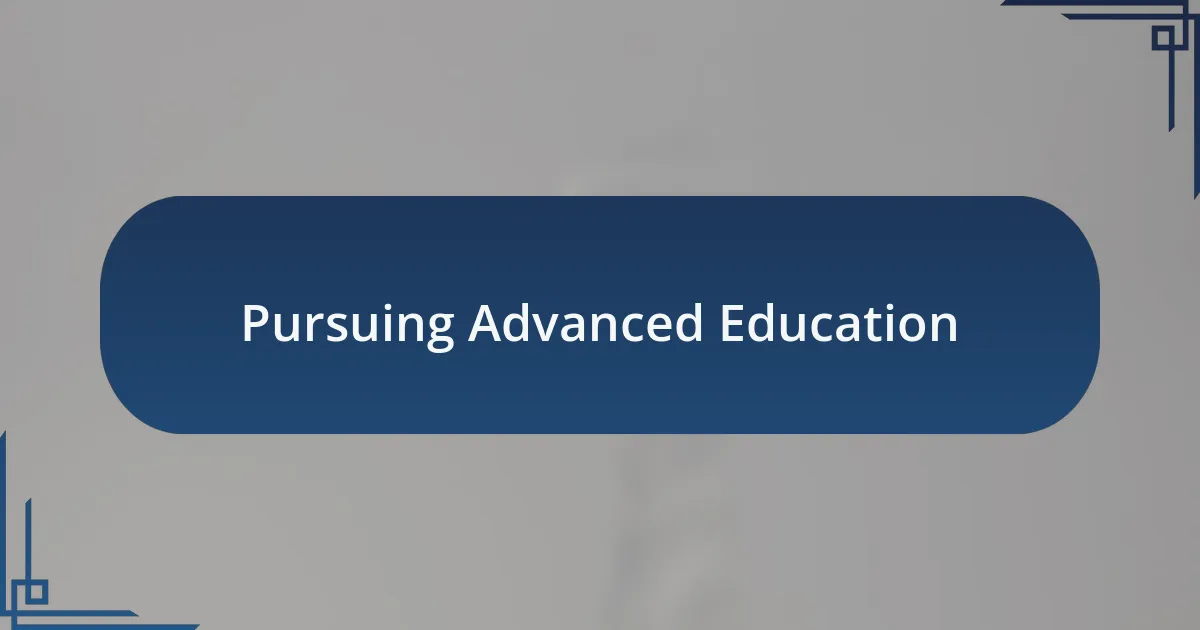
Pursuing Advanced Education
Pursuing advanced education felt like the natural next step in my nursing journey. After several rewarding years in clinical practice, I often found myself reflecting on the knowledge gaps I encountered daily. I realized that advancing my education would not only enhance my skills but also allow me to empower future nurses. Have you ever felt that yearning to deepen your understanding and share it with others?
As I explored graduate programs, I was both excited and intimidated by the prospect. I vividly remember sitting in a seminar, surrounded by like-minded individuals, each of us eager to contribute to the field. It was there I discovered the importance of collaboration in advanced studies. I was amazed at how sharing perspectives could enrich our understanding. Don’t you think working alongside others can inspire new ideas and insights?
Engaging in research was another transformative aspect of my advanced education. I still recall the thrill of diving into a topic that sparked my interest and uncovering new evidence to support effective teaching strategies. This process taught me that education is not static; it’s an evolving practice. Have you found that the more you learn, the more questions arise? For me, this realization only fueled my passion to become a nurse educator, as I understood firsthand how vital ongoing education is in shaping the future of healthcare.
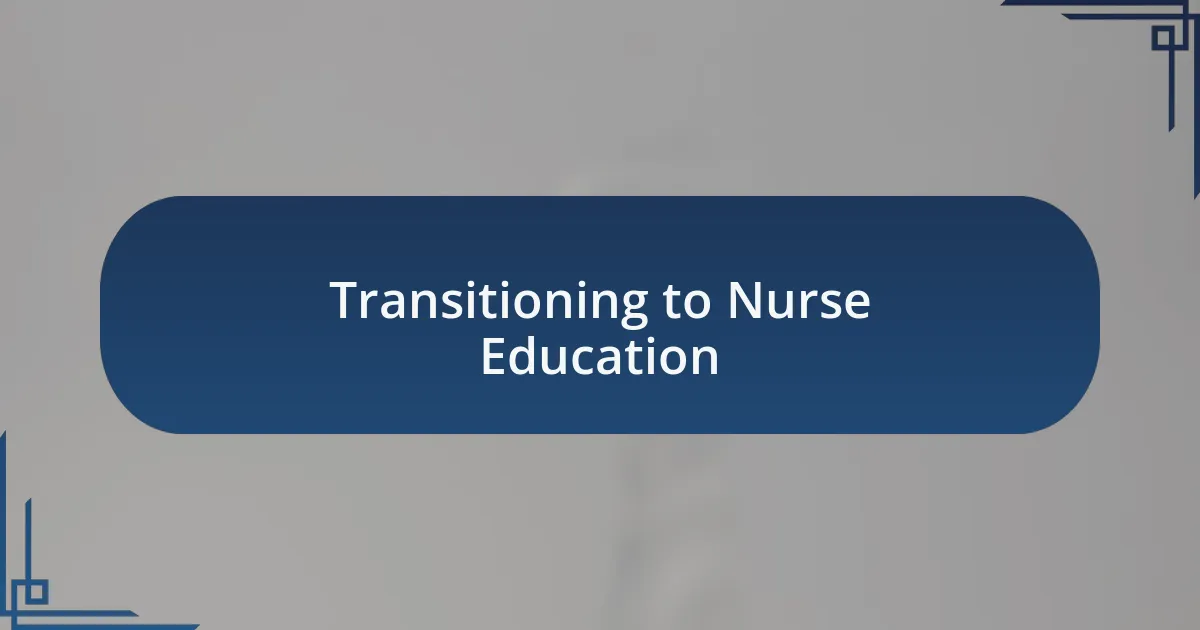
Transitioning to Nurse Education
Transitioning to nurse education was a profound shift for me, blending my clinical experiences with my newfound role as an educator. One moment that stands out is when I first stood in front of a classroom filled with eager nursing students. I felt a comforting rush of responsibility and excitement—after all, these students were the future of nursing. Have you ever felt that electric connection when you realize you’re about to impact someone’s career?
Throughout my journey, I faced challenges, particularly in adapting my communication style from one-on-one patient interactions to classroom settings. It was fascinating to explore different teaching methodologies, trying to find the right balance between lecture and active learning. I remember a particularly engaging class discussion where a student posed a question that pushed us all to think critically. That moment reminded me of the importance of fostering an environment where curiosity thrives. Isn’t it amazing how students can teach us just as much as we teach them?
As I navigated this transition, I found joy in the mentorship aspect of nursing education. Often, students would approach me after class, sharing their fears and aspirations. I realized how important it is to create a safe space where they feel free to voice their concerns. In those conversations, I not only offered guidance but also learned more about their diverse backgrounds and experiences. How do we, as educators, cultivate that sense of belonging in our classrooms? For me, it became clear that building rapport with students is just as crucial as delivering content; it’s about fostering a community ready to embrace the challenges of the nursing profession together.
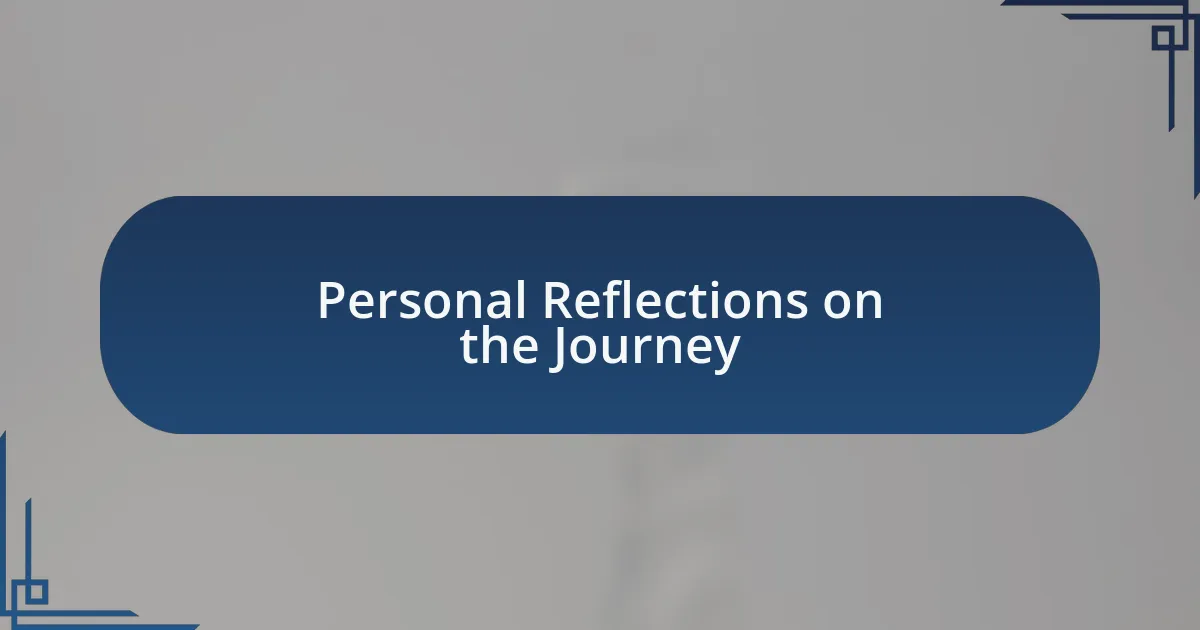
Personal Reflections on the Journey
Reflecting on my journey to becoming a nurse educator, I often think about my first day teaching. I was nervous but also filled with a sense of purpose. Standing there, I realized that my role was not just to impart knowledge but to inspire a passion for nursing in those students. Did I truly understand the depth of that responsibility?
I remember the weight of each question posed by my students, each one an opportunity for growth—for both them and for me. There were moments when a struggling student found the courage to engage and share their experiences. Those interactions illuminated the fact that education is a two-way street. How often do we consider the value of the stories that students bring into the classroom?
As I engaged more deeply with my students, I discovered the transformative power of empathy in education. One particular instance stands out; a student confided in me about their challenges balancing work, school, and personal life. That vulnerability drew us closer and reminded me that teaching is not only about curriculum but also about understanding each student’s individual journey. Isn’t it remarkable how connections can shape the learning environment? My journey thus far has taught me the immense value of listening and relating to my students, reinforcing that education is as much about heart as it is about knowledge.